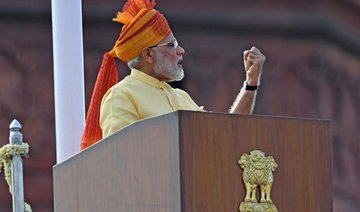NEW DELHI: Indian Prime Minister Narendra Modi, in his Independence Day speech in New Delhi on Tuesday, condemned the killing of people in the name of religion.
The speech, coming on the day when India celebrates its 70th birthday, holds significance. Religious violence and attacks on secularism have defined the three-year government of the Hindu right-wing Bharatiya Janata Party (BJP).
This has created fear among large sections of society about the direction Indian democracy is taking.
Some 6 km away from the Red Fort, where Modi delivered his speech, Abdul Haq Qasmi and some 25 of his students loiter around India Gate, a prominent landmark in New Delhi.
With flags in their hands, they chant “saare jahan se achha Hindustan hamara” (India is better than all the countries in the world).
A local imam in a nearby mosque, Qasmi is very protective of his students, and makes sure they do not get lost in the crowd of hundreds who usually flock to the lawn of India Gate for leisure during holidays.
“History doesn’t allow me to trust Modi,” the 30-year-old told Arab News. “Economic development means nothing if you keep your population in fear and deprive them of peace and harmony.”
It is this fear that outgoing Vice President Hamid Ansari spoke of on the eve of his retirement last week.
In an interview with a television channel, he talked about the “feeling of unease and a sense of insecurity” among Muslims.
Congress Party President Sonia Gandhi expressed concern in Parliament last week about the “dark forces” diminishing India’s core values.
But the BJP and its patron Rashtriya Swayamsevak Sangh (RSS), a radical Hindu right-wing group that works as an ideological fountainhead of the ruling party and Hindu fringe groups, reject these concerns.
Rakesh Sinha, a prominent thinker in the RSS and head of the India Policy Foundation, a right-wing think tank based in New Delhi, described political developments since 2014 as “decolonization of Indian politics and Indian discourse.”
He told Arab News that India’s first Prime Minister Jawaharlal Nehru, who is called the founder of a liberal, secular and democratic India, “Westernized the idea of India, which was alien to the vast majority, and Modi is bringing about a course correction.”
He said “secularism in India so far meant an appeasement of Muslims,” and the creation of an “Islamic ghetto” in the country “that we’re trying to dismantle.” He added: “We’re on the path to becoming a “genuine liberal democracy.”
Many in India find this argument very disturbing. They say it is the resurrection of the “two-nations theory,” which led to the partition of the country and believes that Hindus and Muslims cannot live together.
Gopalkrishna Gandhi, great grandson of India’s iconic freedom fighter Mohandas Karamchand Gandhi, wrote in the English daily Hindustan Times: “The Two Nations Theory, we must now remind ourselves, had Muslim and Hindu adherents. Pakistan slaked the thirst of the first. That of the second is now wandering over the Indian countryside looking for, thirsting for, disemboweling the Indian earth for, the aquifers of hate.”
Irfan Habib, a prominent historian teaching at Aligarh Muslim University (AMU), told Arab News that the current government is “steeped in religious communalism that creates fear among religious minorities.”
Veteran BBC journalist Mark Tully told Arab News: “Modi runs a Hindu government. He has moved away from the center-right position that the previous BJP government under Atal Behari Vajpayee took, and this is disturbing.”
For the rise of Hindu extremist forces, Tully also blames the Congress Party for “not spelling out in clear terms its secular ideology.”
India at 70 is in a state of flux. The very idea of it as a multicultural, multilingual, multi-religious country is at stake.
Seventy years ago, when the nation-building process started, religious minorities trusted the assurances given to them by the political leadership.
Today that trust is broken. Qasmi’s anxiety is genuine, as are the concerns of many regarding the direction the country is taking.
At 70, the idea of India is being questioned
At 70, the idea of India is being questioned













